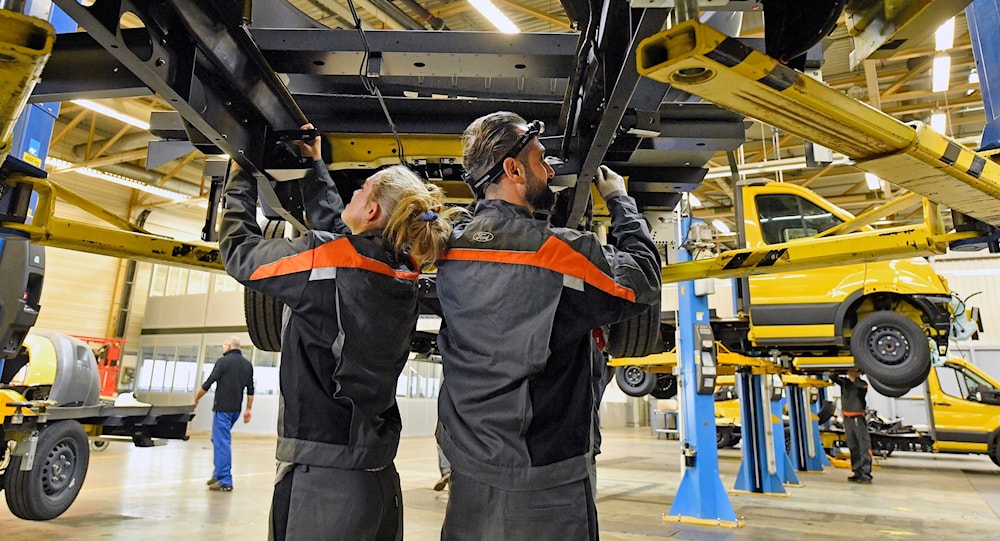German manufacturing at lowest in four months
S&P Global revealed that the manufacturing purchasing managers’ index (PMI) in the Eurozone’s economic powerhouse, Germany, has declined sharply below economists’ expectations.
-

In this October 9, 2018 file photo, workers assemble the new Deutsche Post StreetScooter Work XL electric delivery van at the Ford car plant in Cologne, Germany. (AP)
The latest data collected by S&P Global has shown that German manufacturing activity decreased well below expectations in February, showing a hastened rate of economic downturn.
The manufacturing purchasing managers’ index (PMI) in the Eurozone’s economic powerhouse declined sharply below economists’ expectations to its lowest so far in four months, from 45.5 in January, to 42.3 this month, while the overall business activity in Germany decreased from 47 to 46.1 (any value below 50 signifies shrinking).
German factories continue to grapple amid a decline in global demand, specifically from China, high interest rates, and expensive energy, the figures revealed.
S&P Global stated that this decline was mainly because of a sharp decrease in manufacturing output and a steeper contraction rate, shedding light on the sector’s increasing hurdles.
An economist at Hamburg Commercial Bank, Tariq Kamal Chaudhry, stated, “After a glimmer of hope in recent months, German industry is feeling pretty bleak now." The data shows “a decline in output, alongside plummeting new orders both domestically and internationally.” As concerns of a deepening downturn in the EU’s top economy are surging, manufacturers are pessimistic about the outlook for 2024, economists say.
According to S&P Global, manufacturing and exports in Germany saw a fast-paced decrease in new business, adding to its economic challenges.
Germany's deindustrialization closer than ever
As German manufacturers have been struggling to maintain cost-competitive products, the loss of cheap Russian natural gas due to the war in Ukraine has served as a "final blow" for Germany. The country's reign as an industrial superpower seems to be “coming to an end," Bloomberg News announced on February 10.
Most Russian imports were boycotted in 2022 as a "punishment", which pushed Germany's already declining industrial output since 2017 further down the line. Bloomberg announced that century-old factories are closing and other companies are moving production lines to more cost-friendly countries, Bloomberg said.
CEO at GEA Group AG, machinery producer, Stefan Kelbert, stated, “There’s not a lot of hope if I’m honest,” adding, with concern, “I am really uncertain that we can halt this trend. Many things would have to change very quickly.”
The Federation of German Industries previously released a survey last September revealing that the top reasons for shifting investment abroad are concerns over energy security and energy costs.
BASF SE, Europe’s biggest chemical producer, and Lanxess AG are letting go of thousands of employees as chemical makers were among the manufacturers affected the most by the boycotting of Russian gas. French tiremaker Michelin and US rival Goodyear are also closing or downsizing their German plants.

 3 Min Read
3 Min Read








